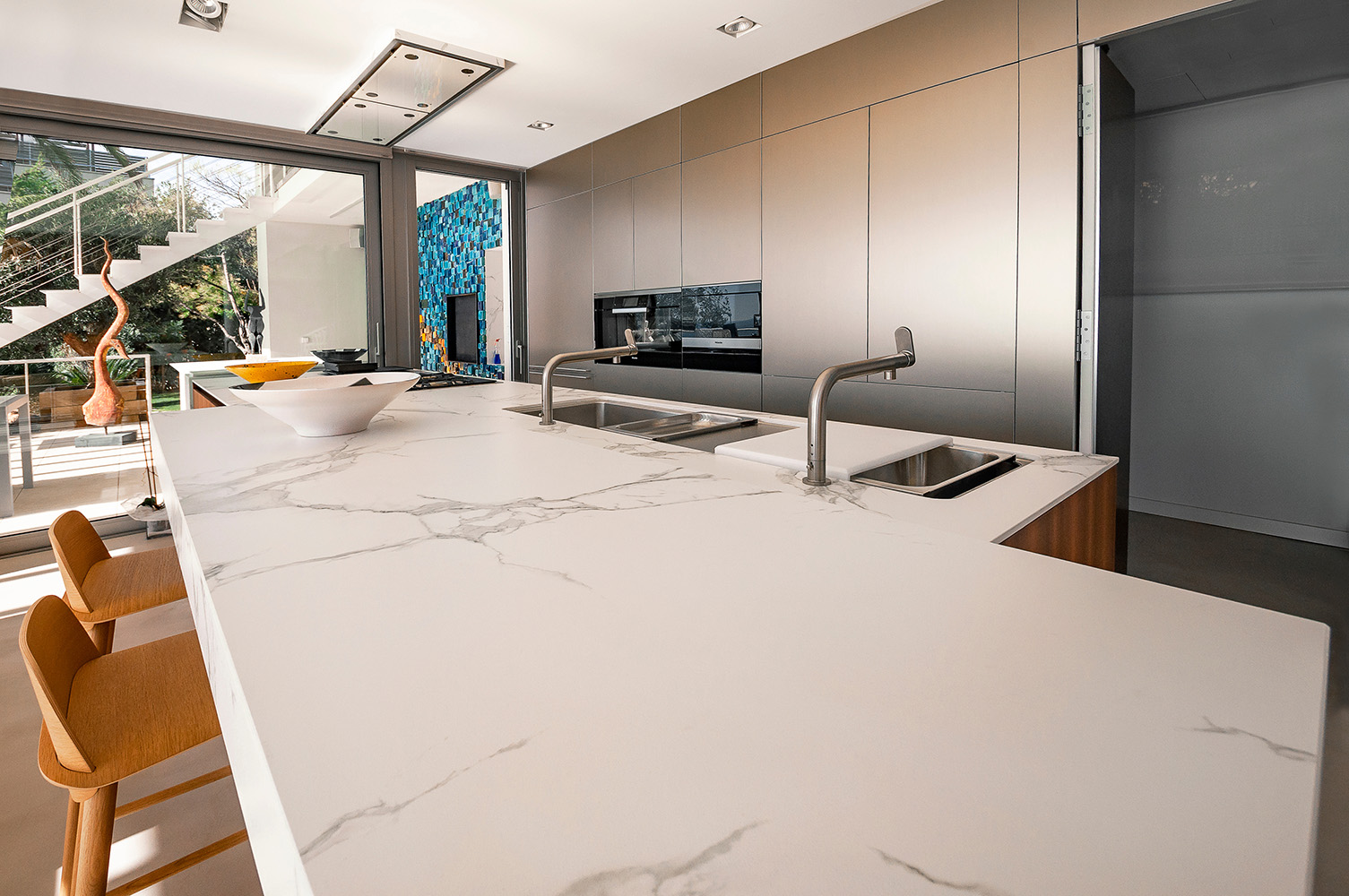If you’re planning a kitchen renovation or are currently building a new home, we’re here to share some of the most popular types of countertops for the new year.
Kitchen countertops come in all types of colors, materials, finishes, and styles, but some are chosen more frequently than others. You should make sure that your kitchen countertop not only looks good but is also durable and easy to maintain.
What is a Popular Countertop Option Right Now?
There are many countertop options available, but there are some that seem to be grabbing more attention than others right now. We are finding that quartz and quartzite continue to be very popular kitchen countertop choices right now.
Top Countertop Materials You Should be Considering.
Quartz
Quartz is a manmade stone comprised of up to 93% natural material mixed with resins and pigments. It is a very durable and low-maintenance kitchen countertop option. The artificial pigments in quartz are added to allow the customer a variety of choices, this makes it a more flexible option when you are coordinating other aspects of your kitchen design such as cabinets, flooring and appliances.
The average price of quartz varies depending on the quality. You can find quartz countertops ranging from $50 to $200 per square foot to install, with the average cost being $125 per square foot.
Pros of Quartz Countertops:
- Easy to clean.
- Variety of color and design options.
- Extremely durable.
- Long-lasting.
- Recyclable.
Cons of Quartz Countertops:
- Expensive.
- Disposed to heat damage.
- Heavy.
Quartzite
Quartzite is an all-natural stone that will require annual sealing. While it is not as low maintenance or stain resistant as quartz, it is more so than some other natural stone countertop options. Remember, since quartzite is a natural stone, it is limited in color and design because it is not customizable.
The average cost for quartzite is generally the same as quartz, however quartzite is more labor intensive to install, thus ends up being more expensive.
Pros for Quartzite Kitchen Countertops:
- Heat resistant.
- UV resistant.
- Low maintenance.
- UV resistant.
- Environmentally friendly.
Cons for Quartzite Kitchen Countertops:
- Limited color options.
- Limited design options.
- Prone to scratches.
- Expensive to install.
- Very porous, requires annual sealing.
Granite
Granite has been a popular countertop option for many years, but it really depends on the slab. There are certain granite patterns and colors that are out of style, but it is still a durable and fairly low-maintenance option if you can find a slab you like. The most popular granite options right now include lighter and more color choices.
The biggest factor with cost for granite is the size and quality. Granite kitchen countertops can cost between $40 and $100 per square foot plus labor.
Granite Pros:
- Exceptionally durable.
- Heat resistant.
- East to clean.
- Available in many design and color options.
- Long-lasting.
Granite Cons:
- Expensive.
- Can crack if not sealed properly.
- Imperfections in the slabs.
Marble
Marble is a natural stone and is often the standard kitchen countertop in luxury kitchens. No two slabs of marble will ever be the same because of sourcing, impurities, colors, patterns and veining. Each piece of marble is unique which means marble countertops come in a variety of prices and qualities.
Marble is generally more expensive, but with regular maintenance it will last years. The average cost of a marble countertop is roughly $60 per square foot, but some cost as much as $100 per square foot, plus you have to add the labor and installation costs.
Pros of Marble Countertops:
- Adds to home value.
- Resistant to heat.
- Unique veining.
- Long-lasting with regular upkeep and sealing.
Cons of Marble Countertops:
- Expensive.
- Requires a lot of maintenance.
- Porous and easily stainable.
- Scratches easily.
Dolomite
Dolomite is a sedimentary rock with similar characteristics to limestone in its composition and coloring – think gray and white. High polished slabs of dolomite can be confused with marble or quartzite to the untrained eye. But dolomite is not as soft and fragile and soft as marble and not as hard and resistant as quartzite.
The cost of dolomite is less than marble, quartz and in some cases granite. Dolomite costs can vary depending on the supplier, but you can expect the cost to be between those of quartzite and marble.
Pros of Dolomite:
- Unique slabs.
- Durable.
- Resistant to Stains.
- Heat Resistant.
- Affordable.
Cons of Dolomite:
- Requires sealing.
- Susceptible to stains if not sealed properly.
What Types of Countertops Are Outdated?
Although granite is still a highly requested kitchen countertop material, some styles are considered outdated. Granite was a very popular option in the ’90s and early 2000s, and the darker speckled colors from that time can give a kitchen a more dated look today.
Laminate countertops, plastic coated synthetic materials, are also another outdated material.
How Do I Choose Kitchen Countertop Material?
Countertops are probably the most important design element in your kitchen, so it is important to choose materials that align with your personal style, but also make sense for your lifestyle. You must always keep maintenance and durability in mind, especially if you and your family spend a lot of time in the kitchen.
If you are planning a kitchen remodel in 2023, give us a call or stop by our showroom at 6144 NC Hwy 43S in Greenville. Our kitchen designer will be happy to show you countertop options in granite, quartz, marble and more. Let us help you find the perfect countertop for your lifestyle today!



